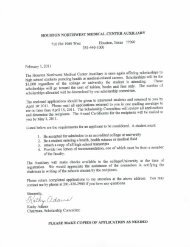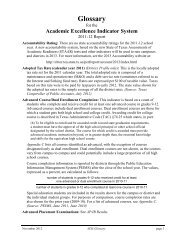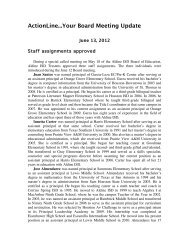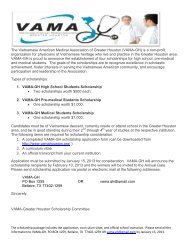Test Taking Tips
Test Taking Tips
Test Taking Tips
Create successful ePaper yourself
Turn your PDF publications into a flip-book with our unique Google optimized e-Paper software.
<strong>Test</strong> <strong>Taking</strong> <strong>Tips</strong><br />
Physical Readiness<br />
• Get a good night’s sleep.<br />
• Eat a nourishing breakfast.<br />
• Wear comfortable clothing, and dress for the temperature of the room you will be<br />
taking the test in.<br />
• Do not take tranquilizers or stimulants.<br />
• If you are supposed to wear glasses, wear them. This is no time for vanity.<br />
• If required,take your admission ticket and picture identification with you.<br />
Reduce Anxiety<br />
• Be on time.<br />
• Don’t rush through the test, but don’t dally either.<br />
• Don’t worry about the whole test at once—tackle questions one at a time.<br />
• Don’t "score" yourself as you take the test.<br />
• Don’t look for letter patterns of correct answers.<br />
• Don’t panic if you have a memory lapse or mental block. This is a normal<br />
occurrence. Go on to the next item and come back to the trouble spot later.<br />
• Don’t expect to know the answer to every question. Expect some items to be too<br />
hard. Just do your best.<br />
• Avoid unnecessary clock-watching, but do be aware of the time.<br />
• Ignore other test takers.<br />
• Don’t sit near your friends.<br />
• Think positively.<br />
• Don’t give up!<br />
Follow Directions<br />
• Read all directions carefully.<br />
• Do the sample questions even though you think you understand.<br />
• If you don’t completely understand what to do, don’t hesitate to ask for<br />
clarification.<br />
• Sometimes you will need to reread the directions or the questions to be sure you<br />
are answering what is being asked.<br />
• Don’t assume that all the questions in the same section follow the same pattern.<br />
One question may ask for a true statement, the next may ask which statement is<br />
not true.<br />
• Don’t guess wildly on a question. Try to eliminate one or two choices to a<br />
question. If you guess, make an "educated guess."<br />
• Make sure that your answers are on the answer document.<br />
<strong>Test</strong> <strong>Tips</strong><br />
• For reading comprehension, read the questions first, then read the paragraph.<br />
• Understand that reading to answer specific questions is a different task than
eading for content mastery.<br />
• Answer the easiest questions first.<br />
• Skip over the more difficult items and come back to them later. List these<br />
numbers on scratch paper and be sure to skip that row on your answer sheet.<br />
<strong>Test</strong> Preparation <strong>Tips</strong><br />
When a test is to be given,you can help by making sure your child…<br />
• Gets plenty of sleep the night before the test<br />
• Has breakfast on the morning of the test;<br />
• Goes to school on the day of the test; and<br />
• Knows you think he/she will do well on the test<br />
.<br />
Other things you can do to help your child learn at home:<br />
In general:<br />
• Be interested. Ask what happened today at school.<br />
• Ask to see your child’s school papers.<br />
• Talk with and listen to your child. Ask each other questions and share<br />
experiences.<br />
• Visit stores, museums, festivals, etc., with your child and discuss what your child<br />
learned.<br />
• Go to parent-teacher conferences.<br />
• Let your child know that education is a priority.<br />
• Get to know your child’s teacher.<br />
• Encourage your child to ask the teacher questions.<br />
Homework:<br />
• When your child has homework to do, make sure it gets done.<br />
• Plan a time and a place in your home for your child to study.<br />
• Have your child sit at a table or desk with good light when he/she studies, not in<br />
front of the television.<br />
• If your child never brings work home, find out why. High school courses require<br />
study.<br />
Books:<br />
• Encourage your child to bring books home from school to read.<br />
• Take your child to the public library.
• Ask your child to read aloud to you.<br />
Television:<br />
• Know how long your child watches television. Don’t be afraid to limit the number<br />
of hours watched.<br />
• Know what your child watches on television. Discuss the programs together.<br />
(What was the show about? What are the characters’ names? What happened<br />
first? How did the show end? What might have happened instead? Could it<br />
happen in real life? etc.)<br />
• Make dinner time a time to talk by not watching television.<br />
Computer:<br />
• Investigate programs to encourage interests and aid in learning.<br />
• Use the Internet as a research tool for completing assignments.
















